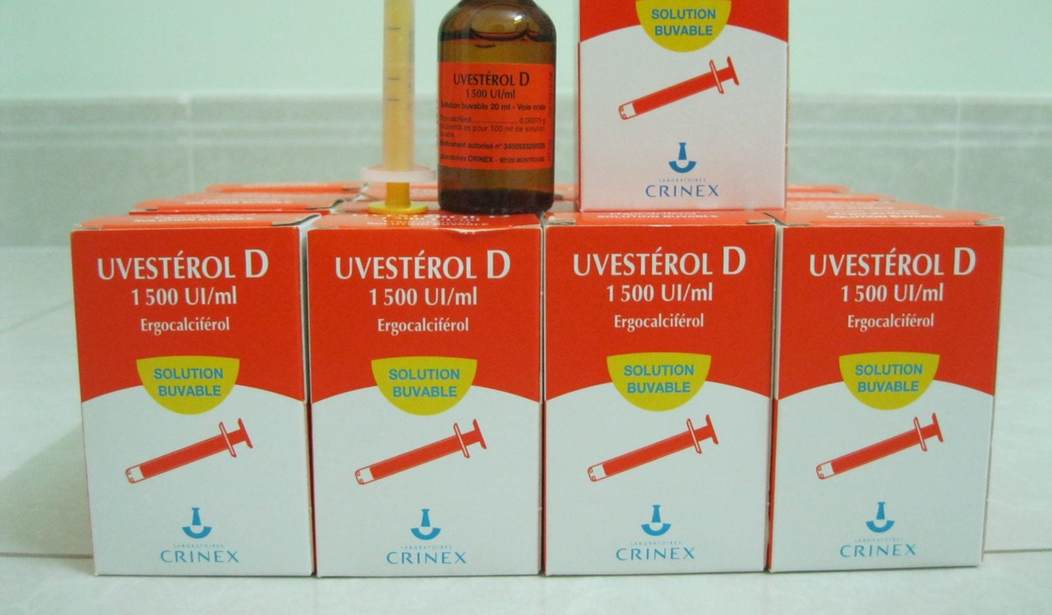France has suspended the sale of a widely used vitamin D supplement after it was linked to the death of a newborn baby.
The 10-day-old child died at home on December 21 just hours after being given a dose of Uvesterol D, which is widely administered to French children under the age of five to prevent a vitamin D deficiency, which can lead to rickets. After being given the medication orally through a plastic pipette, the baby died two hours later of cardio-respiratory arrest.
According to the French medical safety agency (ANSM), there was a “probable link” between the Uvesterol D and the baby’s death. The child showed “signs of suffocation” directly after receiving the product, two hours after breastfeeding, the ANSM wrote.
Health Minister Marisol Touraine said children who take the vitamin D supplements are not generally in danger, but added that “it’s the specific way the product is administered that poses risks.” Uvesterol D comes in a vial from which the dose is extracted with the pipette.
Touraine promised parents “transparent, objective and reliable information.”
In a statement, the national medical safety agency (ANSM) said “only Uvesterol D administered with a pipette is involved.”
Uvesterol D is made by Crinex, a French pharmaceutical company, and is only available in France.
From BBC News:
ANSM said that in 2006 it had imposed measures to reduce risks from taking Uvesterol D after adverse effects became known. However, until December there had been no deaths since it went on the market in 1990, it added.
French daily Le Monde has revealed that Uvesterol D has for years been at the centre of fears over how it has been ingested, with several cases documented of serious illness. The paper cited the oily nature of the substance as being different from other types of liquid vitamin D.
The supplement’s producer Crinex changed the pipette in 2006 to prevent the liquid being administered too quickly.
Then, in 2013, the medical safety agency urged parents to give the supplement drip-by-drip before feeding and ensure the baby was in a semi-sitting position. It also reduced the recommended dosage.
In 2014, health journal Prescire called for an end to the use of Uvesterol vitamin supplements for newborn babies, complaining of half-measures and procrastination from both the company and the medical safety agency.
In 2008 the U.S. Centers for Disease Control recommended that all infants and children receive 400 IU/day of vitamin D beginning in the first few days of life.
Human milk typically contains a vitamin D concentration of 25 IU per liter or less. Therefore, a supplement of 400 IU per day of vitamin D is recommended for all breastfed infants. Adequate amounts of vitamin D can be achieved by currently available multivitamin products containing 400 IU of vitamin D per mL or the newly available preparations that contain 400 IU/mL vitamin D alone without other vitamins.
The CDC recommends over-the-counter vitamin D supplements for infants. Once a child is weaned to a vitamin D-fortified formula (consuming at least 1000 mL per day) or a child one year of age or older is weaned to vitamin D-fortified milk, further supplementation is not necessary.
In addition to dietary sources and supplements, children can also obtain vitamin D through exposure to ultraviolet B sunlight. According to a report at American Family Physician, “As little as 10 to 15 minutes of direct sunlight can generate 10,000 to 20,000 IU of vitamin D.” However, parents should be cautious about exposing their young children to the sun. “The AAP recommends that infants younger than six months be kept out of direct sunlight” because it increases their risk of skin cancer. Therefore, the report concludes, “increasing vitamin D supplementation is a reasonable alternative.”
According to American Family Physician, “Vitamin D plays several important roles in the metabolism and absorption of other minerals in the body” and low levels of vitamin D can cause excessive bone resorption, which can lead to rickets.
Adequate levels of vitamin D, on the other hand, “may also help reduce the risk of autoimmune conditions, infection, and type 2 diabetes.” Further, there is some evidence that vitamin D plays a role in reducing the risk of type 1 diabetes in infants and children.










Join the conversation as a VIP Member